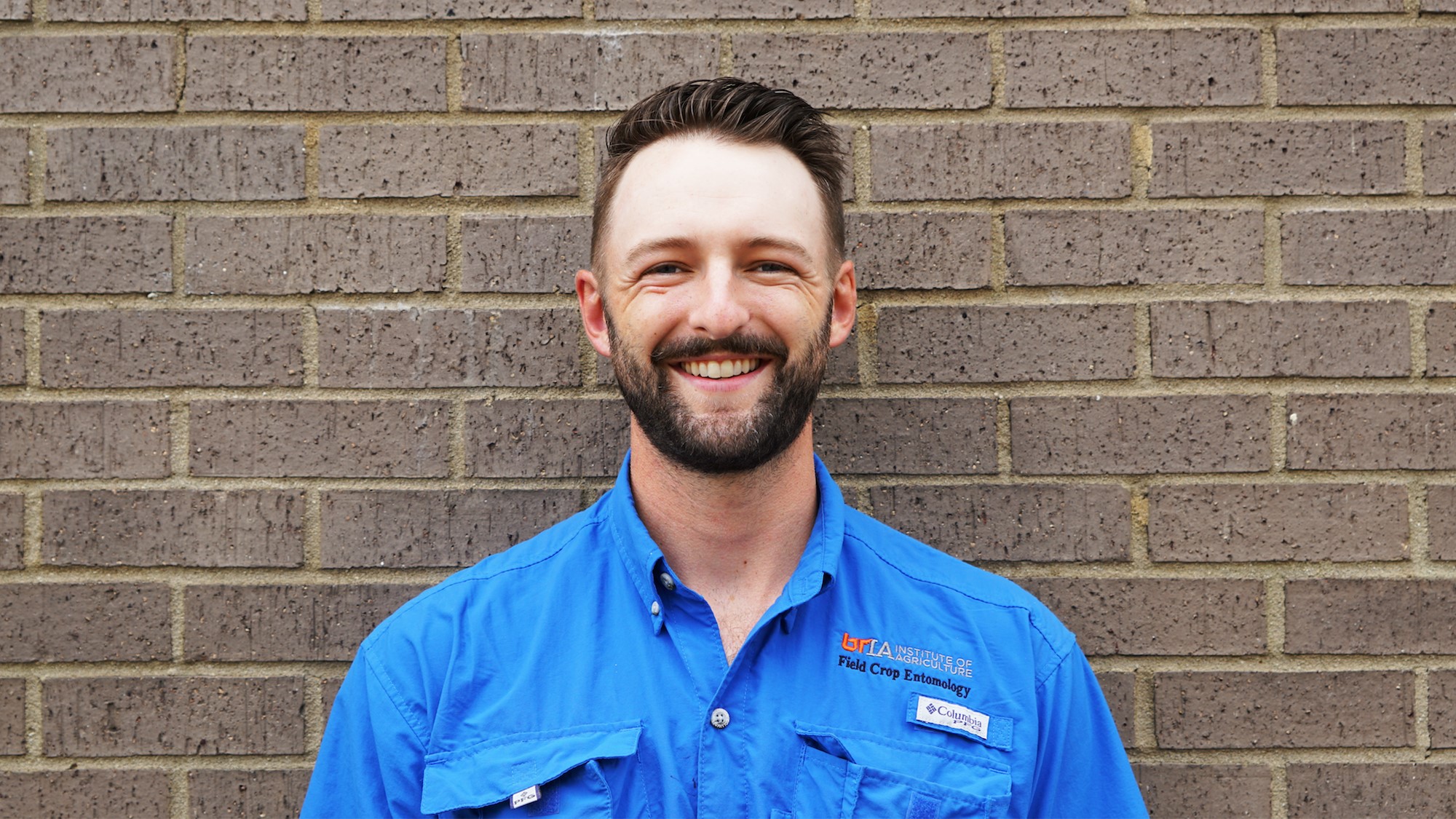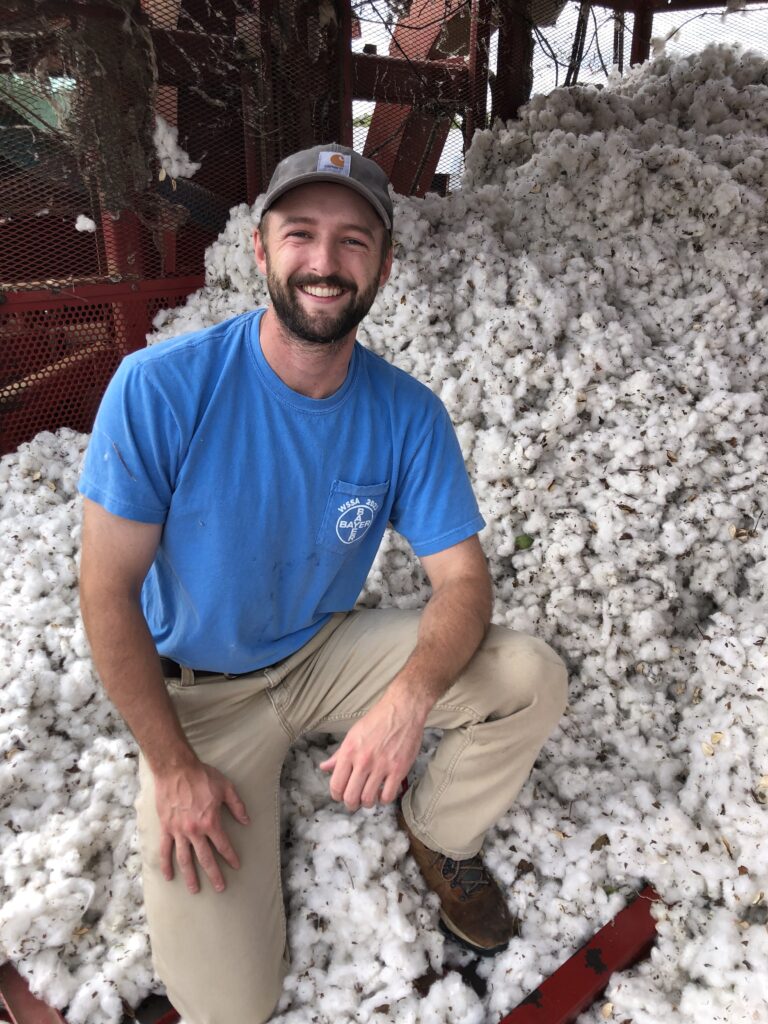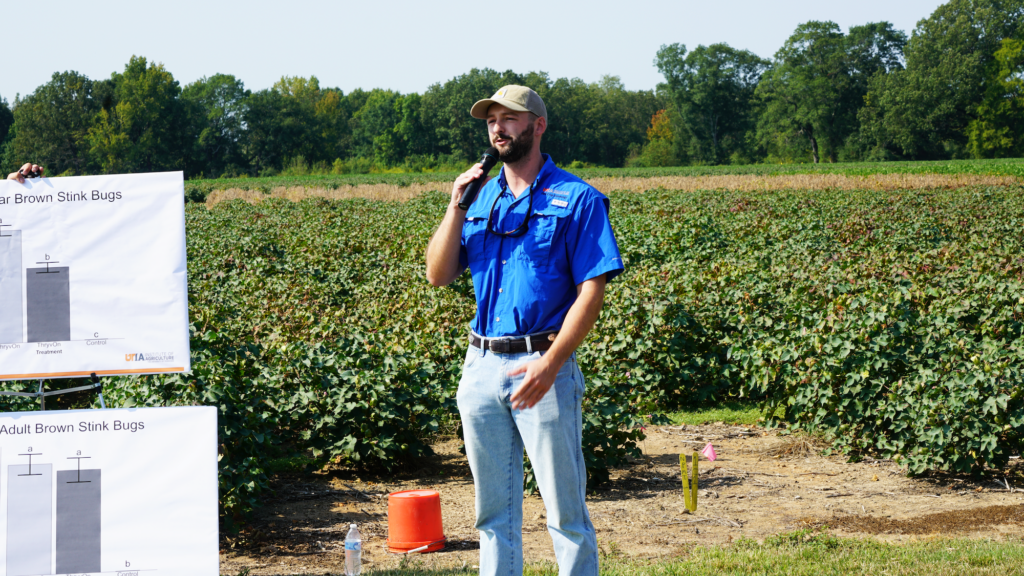
After scouting soybean fields, Nathan Arey discovered a passion for field crop research. Upon earning a bachelor’s degree in biological sciences from Clemson University, Arey pursued a master’s degree at Louisiana State University, interned with Corteva Agriscience, and is now pursuing a doctorate concentrating on sustainable disease and integrated pest management systems under assistant professor Sebe Brown at the West Tennessee AgResearch and Education Center in Jackson. With an impressive record of presentations and leadership roles, including founding the West Tennessee Graduate Student Association, Arey has built a strong foundation for a career in agriculture.
Q&A with Nathan Arey
Can you tell us a little bit about yourself?
I graduated from Clemson University with a bachelor’s in biological sciences in 2020. At the time, I wanted to pursue graduate school to become an insect taxonomist. That quickly changed once I scouted my first soybean field after starting my master’s at Louisiana State University. I instantly fell in love with the complexity of field crops research and enjoyed cutting my teeth in a state with immense pest pressure.
Following my graduation from LSU in 2022, I interned in Stoneville, Mississippi, with Corteva Agriscience in their Crop Protection Discovery and Development division. This experience allowed me to leave my entomology comfort zone and conduct field research with weed scientists and plant pathologists. Following my internship, I began my PhD under Dr. Sebe Brown at the West Tennessee AgResearch and Education Center (WTREC) in Jackson, TN.
What is your current concentration?
My concentration is Sustainable Disease and Integrated Pest Management Systems.
What is your current research question?
I am investigating the potential impacts of ThryvOn cotton technology on clouded plant bugs and stink bugs.
Can you tell us more about your research and its potential impact?
ThryvOn cotton expresses an insecticidal crystal protein (Mpp51Aa2) that has an affinity to bind to the epithelial cells in the midgut of piercing-sucking insects. The objective of my project is to determine if ThryvOn technology has any behavioral or fitness impacts on various stink bug species and clouded plant bugs. I am conducting field, greenhouse, and laboratory studies to achieve this research objective.

What challenges have you faced in answering your research question?
Developing a novel rearing protocol for clouded plant bugs has been the most frustrating challenge in my research. I hope to accomplish this objective this summer and have access to clouded plant bugs for greenhouse and laboratory studies year-round.
What academic course has been your favorite and why?
Field Crop and Vegetable Entomology (EPP523), taught by Dr. Jerome Grant, has been my favorite course. Dr. Grant’s passion for entomology is evident in his teaching style and weekly lectures. I gained valuable information on the pests of vegetable cropping systems that I have yet to work with at this stage in my career.
How has your academic training in the department prepared you for your future career?
Working at a research station full-time has provided me with unique opportunities. I have the ability to learn how to utilize and maintain various pieces of agriculture and farming equipment, speak at various field days, and establish relationships with growers in West Tennessee. These experiences translate into hard and soft skills that are directly transferrable to positions in the agrochemical industry.

What do you believe is your biggest academic achievement?
I placed at the first four student talk competitions I competed in after starting my PhD. Representing the University of Tennessee and placing 1st at the National Entomological Society of America Meeting was a rewarding experience.
What has been the highlight of your graduate school experiences so far?
Enhancing my public speaking skills and gaining confidence when talking to growers and industry professionals have been the best parts of my PhD experience. Since starting my PhD, I have had the opportunity to give 17 talks (4 outreach, 6 extension, 7 professional). My favorite talks have been at grower-focused events such as the Milan No-Till Field Day, Cotton Focus, and Cotton Tour.
Are you involved in any extracurricular activities?
I founded the West Tennessee Graduate Student Association (WTGSA) during the Spring of 2025 and am the current President. The goal of the WTGSA is to foster a sense of community amongst graduate students in Jackson, TN, through social, outreach, service, and education-based activities and events. I also serve as the University of Tennessee, Knoxville student representative for the Entomological Society of America Southeastern Branch Student Affairs Committee. Starting this semester, I will act as the Vice Chair over the next two years.
What are your favorite hobbies?
I enjoy freshwater fishing, hiking, and watching stand-up comedy.
Any advice you would like to share with a prospective student?
Resist the temptation to become narrowly focused on your research project. Try to step outside of your comfort zone as much as possible. For example, I recognized early in my fieldwork that I could not accurately identify weeds and herbicide symptomology. To address this deficiency, I joined the Southern Weed Science Society Weed Contest team for UTK. Training for this contest was difficult and time-consuming, but the knowledge I gained will help me tremendously in my career. I am competing again this summer to build upon my foundational knowledge.
